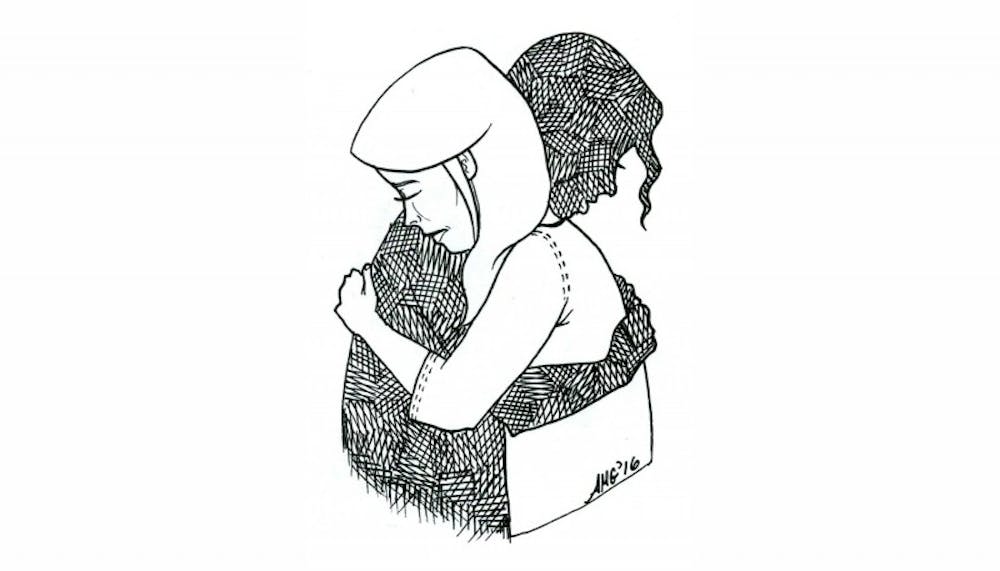The day before my first classes at Penn, I attended two ceremonies: Convocation and an impromptu memorial service. A close friend from high school, John, had died in a plane crash the previous night. A boy on my hall held my hand as I cried during Disney Acapella’s rendition of “I Will Find My Way” from Hercules. We didn’t really know each other, but we didn’t really know anyone. I had arrived on campus four days earlier, ready to spend the next few weeks making the lifelong friends Amy Gutmann promised in her opening speech. Instead, I’d spend them coping with the loss of one. Afterwards, the Class of 2018 jammed the gates of the Quad, laughing, chatting, shaking hands. I swiped in with the rest and retreated to the unpacked boxes of my room.
Gradually, in the weeks following the funeral, the waves of tears became more predictable, less powerful, and less frequent until they broke only on nights when I lay awake and alone in my twin XL. Like everyone else, I learned to drink too much in a safety net of friends and peers who were also drinking too much, confident we’d stumble home together. I learned to get up, sit through a class session and churn out essays in preparation for graduation, the days when there would be no exams to dread or Locust Walk to avoid. I learned to cry about internship rejections and boys who disappeared on purpose. By second semester, the closest I came to contemplating my own mortality on a regular basis was fretting about graduation—my imminent descent into adulthood.
Until, along with every other Penn student, I’d receive an email from the Penn administration informing us of a death on campus—a reminder of the impermanence of not only college, but of us and the things we planned on taking with us when we leave.
Because, even when the name in the email is unfamiliar for more than just the uncharacteristic somber tone or the formal inclusion of a middle initial, the news of the death of a fellow student can be poignant. If you don’t share a string of texts documenting the past few years, you might share a group photo that now feels eerie. If you don’t have memories of watching nights become days on some porch, a chance encounter might retroactively gain significance and wedge itself in your mind. At Penn, so many of our relationships are undefined, and so few degrees of separation fit between even the least acquainted people that it’s almost impossible not to feel an abrupt absence. Whether the news tears your world apart or just casts a shadow over your week before you and everything around you jolts back to normal, there’s a moment of dark surprise we all share.
John’s death, to me, was apocalyptic. But what I hate to admit is, I hadn’t kept him in my life the way I’d thought I would. When we shared a tearful goodbye at our boarding school graduation a few months earlier, we’d been close for three years, through the endings of various friendships, relationships, and application processes. Then I’d spent the summer at home in London, he as a counsellor at a summer camp in the U.S., I was headed to Penn, he to Case Western. Like many high school friendships, ours, while retaining its significance, lost its urgency. But once I knew he was gone forever, I started seeing him under the hoods of Penn sweatshirts on Locust, behind Solo cups in dark houses with sticky floors, amidst the faces of ranging familiarity assembled above McClelland for the Econ Scream.
Of course, I never found him. But as my life continued, I found new people to hold on to through the various losses—personal and communal—of the past few years. With a semester and a half left to go, the Class of 2018 has learned of those losses through emails, two from our own class in the past three months. As more of us turn twenty–two, accept job offers, pack up our rooms and fade from each other’s consciousness, that list can only get longer. And there’s something about that knowledge that makes us see the circles of people we’ve formed around us, that makes us pull them in closer as our last few months together slip away.
I’m scared that I cling to these elusive things I know I’ll have to let go someday. I’m scared of having to translate my years as an English major into a profession. I’m scared of bills, four year plans, and having to dress appropriately on a daily basis. But, more than any of that, I’m scared of losing this sense that we’re a part of something less fragile than ourselves—this feeling that Yale essayist Marina Keegan called “The Opposite of Loneliness,” and described as “not quite love” and “not quite community.” She said, “It’s just this feeling that there are people, an abundance of people, who are in this together.” On my bus ride from New York the Monday after Fall Break—the day of the last email—I made phone calls to friends directly affected and mental notes of comfort food I could deliver and advice I could give, all of which I knew would fix nothing. And yet, as useless as I felt, I was overwhelmed by a sense of belonging. My little world at Penn had never been more damaged, but returning to it had never felt more like coming home.

